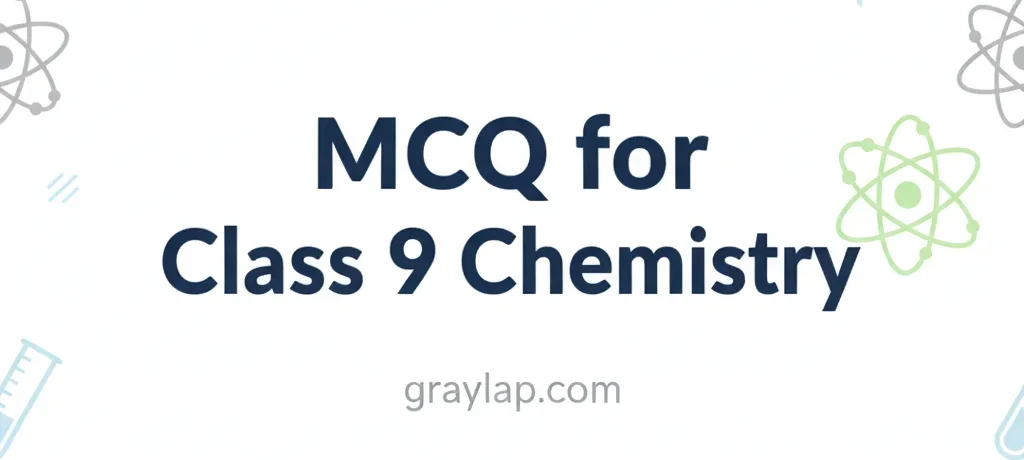Class 9 Chemistry is a subject that helps in understanding the structure of the world and chemical processes on a scientific basis. MCQs (Multiple Choice Questions) are very important for exam preparation because they not only clarify the concepts but also save time.
In today’s article, we will discuss MCQs for Class 9 Chemistry completely so that students can prepare for the exam easily.
Importance of 9th Class Chemistry MCQs
Each chapter of Chemistry includes specific concepts and formulas. If you practice chapter-wise MCQs, not only will you recognize difficult questions, but your confidence in answering correctly in the exam will also increase.
Benefits of solving MCQs:
- Practice answering within time
- Better understanding of concepts
- More chances of scoring marks in exams
- Improved memory
9th Class Chemistry MCQs
Chapter 1: Fundamentals of Chemistry
- Which branch of chemistry deals with the study of carbon compounds?
A) Physical Chemistry
B) Organic Chemistry
C) Inorganic Chemistry
D) Analytical Chemistry - The smallest particle of an element that can take part in a chemical reaction is:
A) Molecule
B) Atom
C) Ion
D) Proton - The symbol ‘Na’ stands for:
A) Nitrogen
B) Sodium
C) Nickel
D) Neon - Which of the following is a compound?
A) Air
B) Water
C) Oxygen
D) Nitrogen - The process of separating mixtures into pure components is called:
A) Condensation
B) Distillation
C) Filtration
D) Sublimation
Chapter 2: Structure of Atoms
- The nucleus of an atom contains:
A) Electrons only
B) Protons and neutrons
C) Protons and electrons
D) Neutrons only - Who discovered the electron?
A) Rutherford
B) J.J. Thomson
C) Bohr
D) Dalton - Atomic number is equal to the number of:
A) Neutrons
B) Electrons
C) Protons
D) Both protons and neutrons - The charge on a neutron is:
A) Positive
B) Negative
C) Neutral
D) Variable - The mass number of an atom is the sum of:
A) Protons and electrons
B) Electrons and neutrons
C) Protons and neutrons
D) Neutrons only
Chapter 3: Periodic Table and Periodicity of Properties
- The modern periodic table was given by:
A) Mendeleev
B) Moseley
C) Dalton
D) Thomson - Elements in the same group have:
A) Same number of neutrons
B) Same number of protons
C) Same number of valence electrons
D) Same atomic masses - The horizontal rows in the periodic table are called:
A) Groups
B) Periods
C) Columns
D) Families - The element with atomic number 1 is placed in:
A) Group I-A
B) Group II-A
C) Group VII-A
D) Group VIII - The most electronegative element is:
A) Fluorine
B) Oxygen
C) Chlorine
D) Nitrogen
Chapter 4: Structure of Molecules
- Chemical bond is formed due to:
A) Sharing or transfer of electrons
B) Exchange of protons
C) Attraction of neutrons
D) Movement of nuclei - Covalent bond is formed by:
A) Transfer of electrons
B) Sharing of electrons
C) Donation of electrons
D) Neutralization - Ionic bond is formed between:
A) Metal and metal
B) Metal and non-metal
C) Non-metal and non-metal
D) Two gases - The molecule of water (H₂O) is:
A) Linear
B) Angular
C) Planar
D) Tetrahedral - The bond between hydrogen and chlorine in HCl is:
A) Ionic
B) Covalent
C) Metallic
D) Coordinate
Chapter 5: Physical States of Matter
- Which state of matter has definite shape and volume?
A) Solid
B) Liquid
C) Gas
D) Plasma - The movement of particles is fastest in:
A) Solids
B) Liquids
C) Gases
D) Metals - The process of changing solid directly into gas is called:
A) Melting
B) Condensation
C) Sublimation
D) Evaporation - The pressure of a gas increases when:
A) Volume increases
B) Temperature decreases
C) Volume decreases
D) Temperature remains constant - Boyle’s law relates:
A) Pressure and temperature
B) Pressure and volume
C) Volume and temperature
D) Mass and volume
Chapter 6: Solutions
- A homogeneous mixture is called:
A) Suspension
B) Colloid
C) Solution
D) Compound - The substance that dissolves is called:
A) Solute
B) Solvent
C) Solution
D) Mixture - Water is called a universal solvent because:
A) It is colorless
B) It dissolves many substances
C) It has low boiling point
D) It is neutral - Concentration of a solution is expressed in:
A) Moles
B) Litres
C) Grams
D) Percentage - The solubility of solids in liquids increases with:
A) Decrease in temperature
B) Increase in temperature
C) Increase in pressure
D) Decrease in pressure
Chapter 7: Electrochemistry
- The flow of electric current through a solution is due to:
A) Electrons
B) Ions
C) Molecules
D) Atoms - The process of chemical decomposition by passing current is called:
A) Ionization
B) Electrolysis
C) Neutralization
D) Oxidation - In electrolysis, the positive electrode is called:
A) Anode
B) Cathode
C) Electrode
D) Battery - The ion which moves toward cathode is:
A) Anion
B) Cation
C) Neutral atom
D) Electron - The unit of electric current is:
A) Volt
B) Ampere
C) Ohm
D) Joule
Chapter 8: Chemical Reactivity
- Metals are generally:
A) Electron acceptors
B) Electron donors
C) Non-reactive
D) Insulators - Non-metals form:
A) Basic oxides
B) Acidic oxides
C) Amphoteric oxides
D) Neutral oxides - Reactivity of metals decreases from:
A) Top to bottom
B) Bottom to top
C) Left to right
D) Right to left - Sodium reacts vigorously with:
A) Water
B) Nitrogen
C) Sulfur
D) Oxygen - The most reactive non-metal is:
A) Fluorine
B) Oxygen
C) Nitrogen
D) Chlorine
Answer’s Key
Chapter 1: Fundamentals of Chemistry
- B) Organic Chemistry
- B) Atom
- B) Sodium
- B) Water
- B) Distillation
Chapter 2: Structure of Atoms
- B) Protons and neutrons
- B) J.J. Thomson
- C) Protons
- C) Neutral
- C) Protons and neutrons
Chapter 3: Periodic Table and Periodicity of Properties
- B) Moseley
- C) Same number of valence electrons
- B) Periods
- A) Group I-A
- A) Fluorine
Chapter 4: Structure of Molecules
- A) Sharing or transfer of electrons
- B) Sharing of electrons
- B) Metal and non-metal
- B) Angular
- B) Covalent
Chapter 5: Physical States of Matter
- A) Solid
- C) Gases
- C) Sublimation
- C) Volume decreases
- B) Pressure and volume
Chapter 6: Solutions
- C) Solution
- A) Solute
- B) It dissolves many substances
- D) Percentage
- B) Increase in temperature
Chapter 7: Electrochemistry
- B) Ions
- B) Electrolysis
- A) Anode
- B) Cation
- B) Ampere
Chapter 8: Chemical Reactivity
- B) Electron donors
- B) Acidic oxides
- B) Bottom to top
- A) Water
- A) Fluorine
9th Class Chemistry MCQs PDF Download
Tips for Solving MCQs
- Solve the “Exercise MCQs” at the end of each chapter.
- Find repeated MCQs from previous years’ board papers.
- While memorizing chemistry formulas, keep their symbols and units in mind.
- Practice at least 20 MCQs daily.

Conclusion
MCQs for Class 9 Chemistry are very important not only for board exams but also for daily preparation. If you keep practicing MCQs regularly, you will not only find the concepts easy but also score higher marks.
Try to memorize the MCQs of each chapter by understanding them, not by rote — only then will Chemistry become your favorite subject.
Best 9th Class Chapter Wise Test English Free PDF 2025
9th Class Biology Chapter Wise Test Best Preparation Guide


5 thoughts on “9th Class Chemistry MCQs Important Questions for Exam Preparation Introduction”